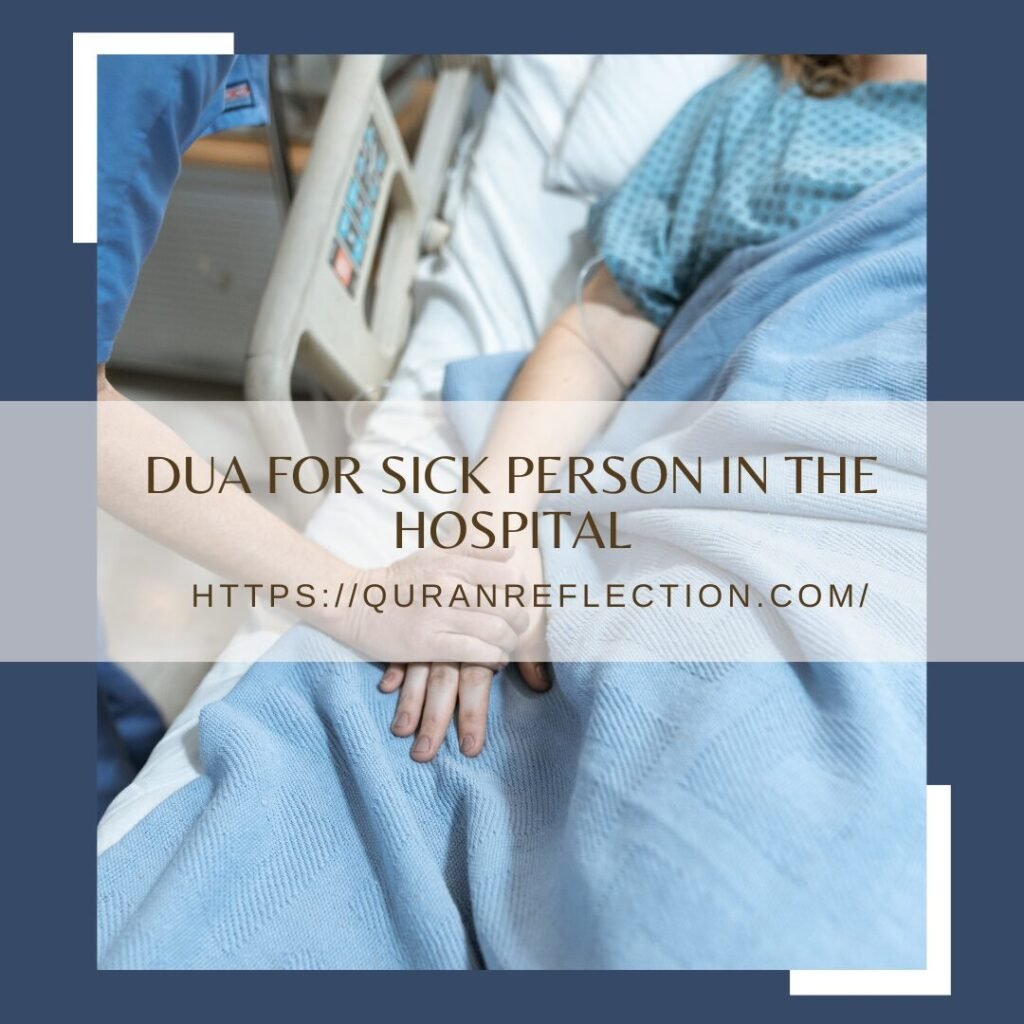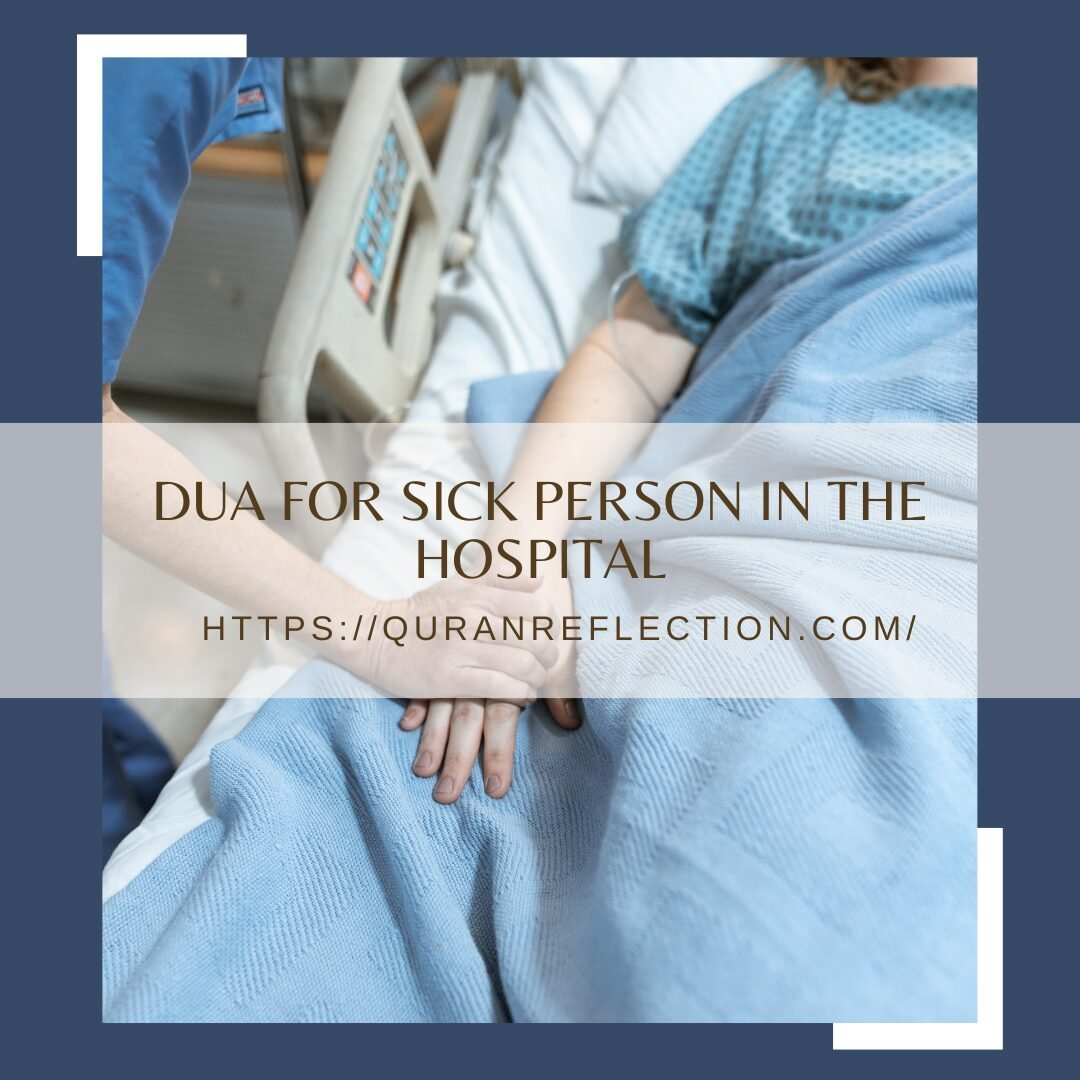Dua For Sick Person In The Hospital
Introduction:
The Healing Power of Dua: Bringing Comfort to the Sick in Hospitals:
In the quiet, uninfected rooms of hospitals, where the air is thick with anxiety and the future often feels uncertain, the power of dua (prayer) emerges as a source of comfort and optimism. For many believers, dua is not just a routine practice but a heartfelt connection to the Heaven, a source of strength and healing. When a loved one is sick, particularly in the hospital, the recitation of dua can transform the atmosphere, filling it with calm and spiritual comfort.

The Spiritual Essence of Dua:
Dua, in its essence, is a profound act of worship, a direct supplication to Allah. It embodies humility and trust, acknowledging human frailty and divine omnipotence. In Islam, dua is a means of seeking Allah’s mercy, blessings, and intervention. It is a personal plea that carries immense spiritual weight, especially in times of illness.
When someone falls ill, dua becomes an integral part of the healing process. It is a reminder that while medical treatments and interventions are crucial, ultimate healing comes from Allah. This dual approach—relying on both medical care and divine intervention—provides a holistic path to recovery.
Powerful Duas for the Sick:
Islamic tradition offers several specific duas that are particularly poignant for those who are ill. These supplications are rich in meaning and serve to comfort both the patient and their loved ones. Here are some key duas that can be recited:
- From the Quran:
- Surah Al-Isra (17:82): “And We send down from the Qur’an that which is healing and mercy for the believers.”
- Surah Ash-Shu’ara (26:80): “And when I am ill, it is He who cures me.”
- From Hadith:
- Sahih Muslim: “O Allah, the Lord of mankind, remove the difficulty and heal. You are the Healer. There is no healing except Your healing, a healing that leaves no illness behind.”
- General Dua for Healing:
- “O Allah, remove the harm, O Lord of the people. Heal, for You are the Healer. There is no healing but Yours, a healing that leaves no disease behind.”
These supplications can be recited by the patient, their family members, or friends. The act of making dua together can strengthen the bonds of love and support, creating a united front against illness.
The Emotional and Psychological Benefits of Dua:
The practice of dua offers significant emotional and psychological benefits. For patients in hospitals, the sense of helplessness can be overwhelming. Dua provides a sense of agency and control, allowing patients to actively participate in their healing journey. It fosters hope, reduces stress, and can even improve overall health outcomes by promoting a positive mindset…. Read More: Dua For Anxiety And Depression
Research in psychology has shown that spirituality and prayer can enhance emotional well-being. When patients engage in dua, they tap into a deep reservoir of faith and resilience. This spiritual connection can alleviate feelings of isolation and fear, replacing them with a sense of peace and assurance.
Moreover, dua is a reminder of Allah’s compassion and mercy. It reassures patients that they are not alone in their suffering; Allah is always near, listening to their pleas and providing comfort. This spiritual companionship can be profoundly comforting, especially during the lonely, difficult moments in a hospital.
Community Support and Collective Dua:
In Islam, the community plays a vital role in supporting those who are ill. Visiting the sick and praying for them is highly encouraged. The Prophet Muhammad (peace be upon him) emphasized the importance of this practice, saying: “When a Muslim visits his sick brother, he is walking along the paths of Paradise until he sits down. When he sits down, he is engulfed in mercy, and if it is in the morning, seventy thousand angels send blessings upon him until the evening, and if it is in the evening, seventy thousand angels send blessings upon him until the morning” (Sunan Ibn Majah).
This tradition highlights the significance of collective support and communal dua. When family and friends gather to make dua for a sick person, they create an environment of spiritual and emotional support. This collective effort can significantly boost the patient’s morale and spirit, aiding in their recovery.
The Life-changing Power of Dua:
In the sterile, clinical environment of a hospital, dua introduces a profound sense of warmth and hope. It transcends the physical confines of the hospital room, reaching into the realm of the divine. Dua is not just about seeking physical healing; it is about finding peace, strength, and comfort in the face of adversity.
For those lying in hospital beds, each whispered dua is a lifeline, a testament to the enduring human spirit and unwavering faith. It is a reminder that, regardless of the severity of the illness, Allah’s mercy and healing are boundless. Through dua, patients and their loved ones can navigate the challenges of illness with grace and resilience, fortified by their trust in Allah’s compassion and care.
In times of sickness, let us embrace the power of dua, drawing strength from our faith and finding comfort in our supplications. For in every dua lies the promise of healing, hope, and the unwavering presence of the Divine.











